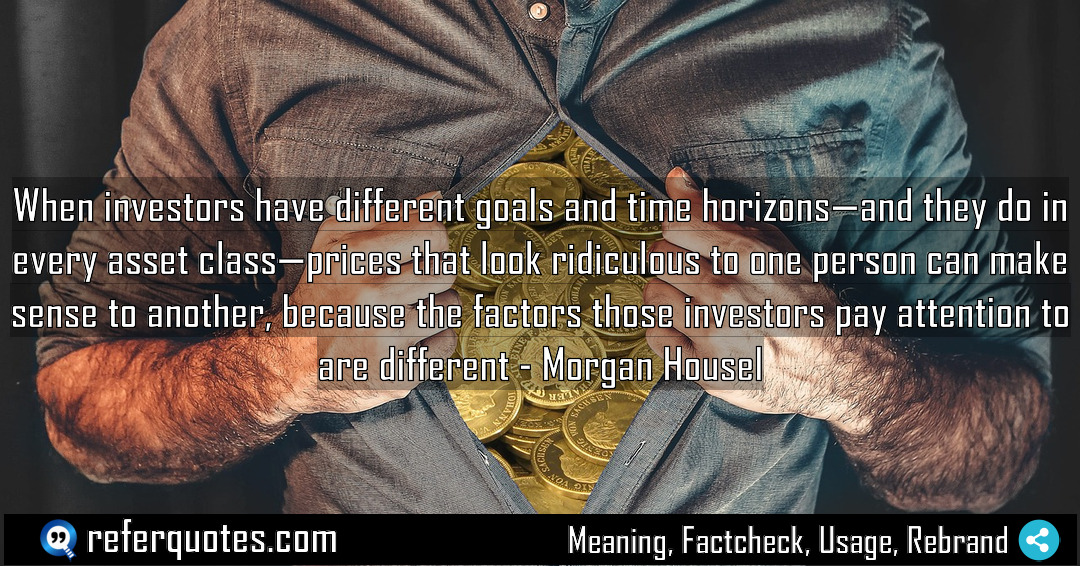
When investors have different goals and time horizons, the entire market starts to make a lot more sense. It’s not about who’s right or wrong, but about what each person is actually trying to achieve.
Share Image Quote:
Table of Contents
Meaning
The core message here is that there is no single “correct” price for an asset. Value is not an objective number; it’s a personal calculation based on individual circumstances.
Explanation
Let me break this down for you. I’ve seen this play out so many times in my career. A young tech investor with a 30-year time horizon might look at a volatile growth stock and see a golden opportunity. They can afford to ride out the dips. Meanwhile, a retiree who needs stable income looks at that same chart and sees a heart attack waiting to happen. They’re both right. The price isn’t ridiculous; it’s just serving a different master. The market isn’t a single monolith—it’s a chaotic, beautiful collision of millions of individual plans. Once you internalize that, you stop trying to figure out why “everyone else is so stupid” and start understanding the logic behind the madness.
Quote Summary
Reading Level60
Aesthetic Score60
Origin & Factcheck
This wisdom comes directly from Morgan Housel’s fantastic book, The Psychology of Money, which was published in 2020. It’s a modern classic for a reason. You sometimes see this idea paraphrased elsewhere, but this specific phrasing is Housel’s.
Attribution Summary
Where is this quotation located?
| Quotation | When investors have different goals and time horizons—and they do in every asset class—prices that look ridiculous to one person can make sense to another, because the factors those investors pay attention to are different |
| Book Details | Publication Year: 2020; ISBN-10: 0857197681; ISBN-13: 978-0857197689; Pages: 256 (approx.) |
| Where is it? | Unknown chapter / page |
Context
In the book, Housel uses this concept to explain seemingly irrational market behavior, like why a company with no profits can have a sky-high valuation. He’s arguing that finance is not a hard science like physics; it’s a soft science driven by human behavior, and you have to account for all the different players on the field.
Usage Examples
Here’s how you can actually use this idea:
- For a frustrated investor: Next time you see a stock price that makes zero sense to you, instead of dismissing it, ask: “What investor, with what specific goal, does this price make perfect sense for?” It’s a game-changing perspective shift.
- For a financial advisor: Use this to explain to clients why their neighbor’s “can’t lose” investment is a terrible fit for their personal financial plan. It reinforces the need for a tailored strategy.
- For a team leader: This isn’t just about money. It applies to any resource allocation. Different departments will value a new software tool or a marketing budget differently based on their unique goals and “time horizons” for seeing results.
To whom it appeals?
Share This Quote Image & Motivate
Motivation Score55
Popularity Score60
Shareability Score60
FAQ
Question: Does this mean any price is justified?
Answer: Not at all. It just explains the *mechanism* behind price discovery. Bubbles still happen when collective narratives overshoot reality, but understanding individual motives helps you see the bubble forming.
Question: How can I apply this to my own investing?
Answer: It’s the ultimate defense against FOMO (Fear Of Missing Out). It forces you to define your own goals and time horizon so clearly that other people’s trades become irrelevant noise.
Question: Is this the same as “the greater fool theory”?
Answer: It’s related, but more nuanced. The greater fool theory assumes you’re just betting on a bigger fool. Housel’s point is that the next buyer isn’t necessarily a fool—they might just have a completely different, and rational, set of priorities than you do.
Similar Quotes
You know, the market’s behavior makes it possible for the investor to do something incredible. It’s all about flipping the script on fear and greed, buying when others are panicking…
When people are financially invested, they want a return. But when they’re emotionally invested… that’s when the magic happens. They shift from being spectators to active contributors, and that’s the…
You know, “The intelligent investor buys from pessimists” isn’t just a line—it’s a battle-tested strategy. It’s all about finding value where others see only fear and capitalizing on the euphoria…
People live under the illusion that they know what they want, but this quote reveals how our desires are often shaped by external forces. It’s a powerful insight into the…
You know, the intelligent investor realizes that stocks become more risky as prices climb, not less. It’s a complete inversion of how most people think, and honestly, it’s the bedrock…
